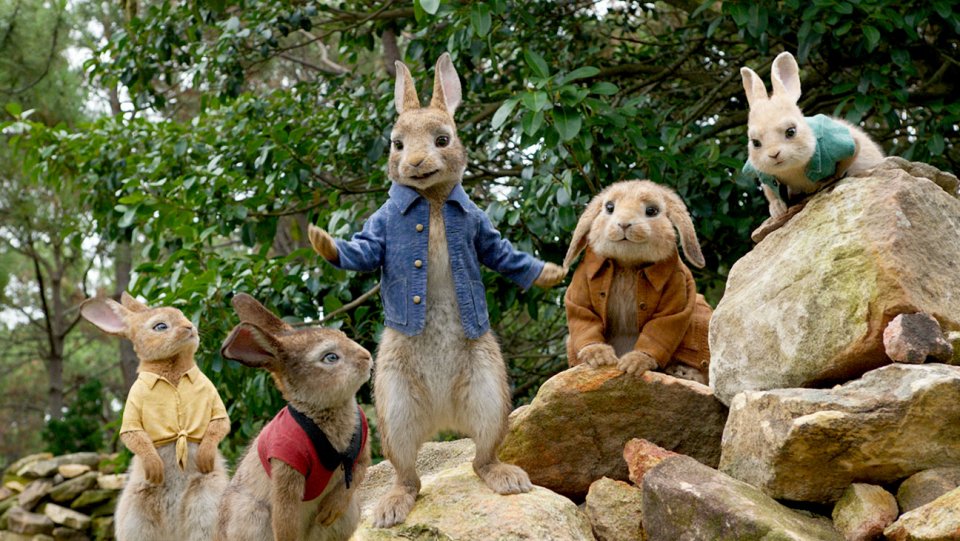Sony’s Peter Rabbit; or Paddington Done Wrong
Jordan Bosch
I haven’t thought much about Beatrix Potter’s Peter Rabbit stories since I was read them as a small child. But I remember liking how cute and charming they were for basic morality tales, as well as the quaint little world they created. Potter (who was also interestingly enough a mycologist) was a pioneer of picture books and Peter Rabbit arguably the first great English childrens character.
So obviously it was upsetting to see a movie coming out that looked by all accounts to be a complete bastardization of one of the most esteemed bodies of work in children's literature. Walt Disney once attempted to get the rights to Peter Rabbit, but Potter refused. So Sony decided to prove that her fears were well-placed.
After doing away with the rabbit-eating farmer Mr. McGregor (Sam Neill), Peter Rabbit (James Corden) is stunned by the arrival of his great-nephew Thomas (Domhnall Gleeson), who wants to refurbish the place and sell it off so he can afford his own shop in London. As Thomas begins an awkward relationship with an artist and friend of the rabbits called Bea (Rose Byrne)-get it?!-, Peter and the other rabbits harass him in their quest to get food from his garden.
Barring the character names, this movie bears very little resemblance to Potters’ stories. The pastoral innocence and sweetness is replaced with gross marketability and pop culture references. Being set in a modern era gives the film an excuse to play the characters as slick, witty rebels -the kind of cool millennial-friendly protagonists created by formula and focus groups. However it’s egregiously lazy writing and often awkward to watch. There are so many obnoxious choices that clearly come from a similar need to pander to a demographic, such as the constant use of pop songs and the characters dancing or acting over them. The plot of the movie, which these characters are supposed to carry, is half generic British romantic comedy (like a particularly poor imitation of a Richard Curtis film), and half typical “animals vs. humans” comedy in the unfortunate vein of MouseHunt, Over the Hedge, or Furry Vengeance (all of which you probably forgot existed until now). And neither of these is done particularly well.
The romance is the more preferable of the plot-lines if only because it puts the human characters front and centre. Thomas, though written poorly, is technically the villain for most of the movie; and while he is intended to be sympathetic to a degree, he actually is a lot more likeable than the hero. While his ultimate goal is petty, that’s kind of all he is: petty and OCD. Considering he has no desire to cook rabbit pies like his predecessor, all he wants is to keep the wildlife out of his home and garden, which is entirely reasonable. I understand the filmmakers want to have the obvious reconciliation of hero and villain that so many of these movies have done before, but the problem it creates is it makes Peters’ antagonism almost completely unjustified. His reason for harassing Thomas is never strong enough to withstand how undeserved Thomas’ punishments are. And ultimately they’re both framed as characters who have to learn a lesson. Domhnall Gleeson is really trying though, realizing the necessity to play this part a little over-the-top (though strangely not as over-the-top as in Star Wars). Still, for someone who recently starred in Goodbye Christopher Robin, another movie about a famous British children’s character, he really should know better. His nemesis, the title character, if I haven’t made clear is pretty annoying. This isn’t helped by the fact he’s voiced by James Corden, who can be entertaining, but only in small doses. Peter Rabbit in essence is Corden’s star vehicle, and most of the characters’ screen-time is a testament to his habit of trying too hard. His sisters Flopsy, Mopsy, and Cottontail are voiced astonishingly by Elizabeth Debicki, Margot Robbie, and Daisy Ridley, all of whom are far above this material. Rose Byrne is alright, though she’s definitely aware she’s the least interesting character. I wanted more of Sam Neill and his weird Scottish accent, and instead got a depressing Marianne Jean-Baptiste cameo.
While most of the humour in this film completely misses its mark or is obnoxiously overdone slapstick, I will admit there were a couple good jokes, the best being a running gag from a rooster. The sisters have slightly more interesting personalities than Peter and I got a laugh or two from them as well. It’s worth noting too that the animation on the rabbits is very good, emphasizing their cuteness to the point every child watching this movie is going to want a pet rabbit immediately after. The best thing in the movie is a short scene early on (and a reprisal in the end credits) that ex-posits the backstory of the rabbits. Bea’s paintings, of course, are the beautiful illustrations from the books (which is laughable considering her non-rabbit work bears no resemblance whatsoever); and so their origin is told through really nice animation in Potters’ style with the grace of a less violent Watership Down. This is how the movie should have been told!
Going into Peter Rabbit I had extremely low expectations, and the film didn’t meet them. It was still awful, with badly written characters, severely unfunny jokes, a ton of plot holes (it’s notably inconsistent whether the humans can understand the rabbits or not), and you can feel the corporate statistics controlling many aspects of the final product; but it’s not quite rock bottom. However just a few weeks ago I saw Paddington 2, and everything that film did right this one does wrong. It has no sense of the spirit or charm of the original material and is completely dependent on the typical modes of manipulation in bad family films that the Paddington movies so wonderfully shed. I can’t say I’m surprised, but Beatrix Potter deserved better.


